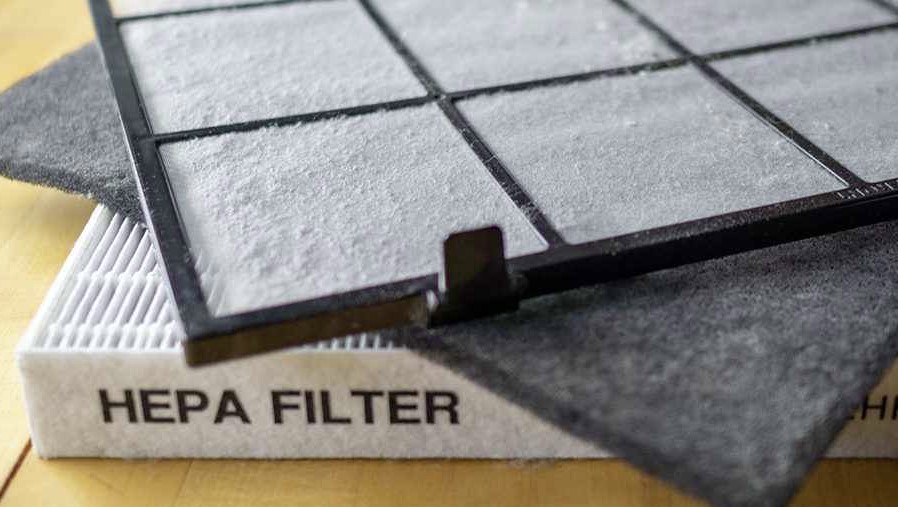HEPA, or high-efficiency particulate air, is a pleated mechanical air filter that can remove 99.97% of airborne particles. It is the most significant element in an air purifier.
Without it, the air filter will not eliminate dust, mold, bacteria, dander, pollen, and other particles as small as 0.3 microns from the air.

One thing about the HEPA filter is that despite being a workhorse in your air purifier, it has its capacity. When that limit reaches, you have to replace it.
But how do you tell when to change a HEPA air filter? Each HEPA filter has many synthetic fibers inside that trap pollutants as air passes through them. The filter is due for replacement when it cannot trap any more airborne particles.
When that happens, you will see small particulates get through the air purifier freely and come down straight into your room. Understand that the frequency of replacing a HEPA filter will depend on how often you use your air purifier.
Contents
What is the right HEPA filter replacement frequency?
A HEPA filter uses thin layers of porous material to capture small particles in the air. As it continues removing the material from the air, it becomes too full to capture more airborne particles.
Ideally, you should change a HEPA air filter anytime between 6 and 12 months. But that will also depend on your indoor air quality, environmental factors, and usage.
Furthermore, those suffering from allergies or asthma should replace the HEPA filters in their air purifiers when their symptoms worsen or season allergies increase.
How long does a HEPA filter last?
The life of a HEPA filter depends on several factors, including size, type, and usage. If the conditions are right, a larger HEPA filter will last up to five years.
However, many more can last an average of 2-3 years, primarily if used in spaces with large amounts of particulate matter in the air.
What happens if you don’t change a HEPA filter?
When you do not replace a HEPA filter, the dust and other airborne pollutants will accumulate and eventually clog it. A clogged HEPA filter cannot remove dander, pollen, and bacteria from the air with 99.97% efficiency.
Furthermore, your air purifier will work twice as hard to pass any amount of air through the clogged filter. It will use more energy than necessary, causing it to overheat and increase your electricity bills.
Eventually, your air purifier will stop working altogether. In some cases, you will also notice your air purifier making so much noise.
How to know if your air filter is dirty
You will know your HEPA filter is dirty when any of the following happens:
- The filter change indicator on your air purifier is ON, or your unit produces a beeping alert.
- The air in your home is stuffier.
- The filter has debris, hair, or dust on it.
- Your home has a musty odor that was not there before.
You will also know that your HEPA filter is dirty when there is a decrease in airflow in your home and the quality of air changes.
Can you wash a HEPA filter?
Not all types of HEPA filters are washable. When buying an air purifier, check for the manufacturer’s label indicating whether it is washable or non-washable.
If your HEPA filter is non-washable, rinsing it will destroy the fibers and prevent it from working with 99.97% efficiency. Other filters might take longer to dry if cleaned. A wet HEPA filter will not capture airborne particles well. If you want to clean your non-washable HEPA filter, consider vacuuming it.
For washable air filters, follow the manufacturer’s instructions while cleaning. Ideally, the process may involve rinsing it using cold water. Do not touch the filter material to avoid destroying it.
After washing your HEPA filter, shake it off first to remove excess water and place it indoors to dry. Lean it against a solid object and allow pass from all sides. You can only wash a HEPA filter once every three or six months or depending on the manufacturer’s instructions.
Conclusion
How often you change a HEPA filter will depend on the type of filter, the size of the house, and how often you use your air purifier. However, consider changing a HEPA filter every six or twelve months.
Note that it is necessary to replace your air filter if it makes noise or if you see debris, hair, or dust on it. Understand that not all HEPA filters are washable, and it is not recommended to wash a non-washable filter.
Related Articles